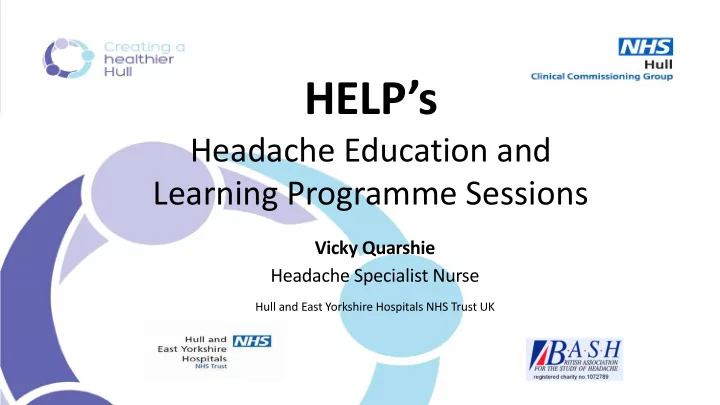

HELP’s Headache Education and Learning Programme Sessions Vicky Quarshie Headache Specialist Nurse Hull and East Yorkshire Hospitals NHS Trust UK
Vision Statements – HELP’s Headache Education Learning Programme Sessions • HELP’s – Empowering patients and putting control back into the patients hands. • Aims to encourage individuals to work collaboratively with their GP’s and provides individuals with the skills to become active managers of their own condition
Vision Statements – HELP’s Headache Education Learning Programme Sessions • Aims to assist GP’s in making an accurate diagnosis of primary headache and enable them to provide the most effective management plan in a timely manner, reducing the need for referral to secondary care as per NICE CG150. • Aims to reduce the need for frequent attendance at GP surgeries and A&E for headache consultations.
Objectives and Outputs • To improve the (Headache) Patient Pathway and patients experience by educating patient’s experiencing frequent headaches • To Improve Assessment, Diagnosis and Management of Primary Headache in the local population • To educate local patient population experiencing frequent headaches and Healthcare professionals involved in their care to enable them to become effective self-managers
Current State • Some patients with chronic primary headaches will present to their GP seeking treatment on a regular basis as often as weekly visits. • Many of these patients will be referred to secondary care for a consultation with a Consultant Neurologist. • These patients will then be managed by the Headache Specialist Nurse who may see the patient a number of times on a follow up basis in telephone and/or outpatient department.
Current State • A number of patients also attend their GP practice repeatedly complaining of headaches. These patients use valuable GP resources in search of a definitive diagnosis and effective treatment plan to manage their condition. • Some GP’s may find it difficult to provide a definitive diagnosis, particularly due to the time constraints of their allocated consultation appointments and may not have the resources readily available to help patients manage their condition.
Current State • In some cases medication overuse occurs and exacerbates rather than improves an individual’s condition and results in a worsening of the patient’s overall headache profile.
Current State • In addition, Patients often seek advice via Accident and Emergency Departments and this can result in many unnecessary and costly investigations and in some cases the added cost of an inpatient stay which can often be up to 4-5 days. • NHS England (Pilot) data supports this.
HELPS programme* NICE, Headaches in over 12s: diagnosis and management www.nice.org.uk/guidance/cg150. Pt presents at GP Surgery with Headache *HELPs programme developed by Vicky GP decides if appropriate for referral to Headache Education Programme Session. Quarshie, Headache Specialist Nurse, Hull Royal Infirmary Yes No Pt identified by GP as suitable for referral: GP Diagnoses Patient as per; International Headache Society • No ‘Red Flag’ Symptoms (Appendix 3) Classification System ICHD-II ( NICE Guidelines CG150 ) http://www.ihs-classification.org/en/ www.nice.org.uk/guidance/cg150 and manages Patient as per; • Pt’s with primary headache disorders requiring Information & NICE Guidelines (CG150) Education to enable them to manage their condition more effectively. www.nice.org.uk/guidance/cg150 • Migraine +/- Referral to Headache Service HEY Hospitals NHS Trust • Cluster Headache • Tension Headache • Medication overuse headache Pt booked into session via chose and book and also given • Undiagnosed Chronic Headaches – (No Red Flags) follow-up appointment with GP to discuss headaches 6 • Unclear history/ difficulty making diagnosis weeks post attendance at education session Pt returns to GP Surgery after 6 weeks with completed headache Pt to attend Planned Education Session to cover; diaries and summary: •Overview of Common Primary Headaches •When to worry when to see your GP Diagnosis confirmed by patient diary •Overview of available Treatments GP to implement management plan as per NICE guidance on •Diet and Lifestyle Headaches •Relaxation exercises If Medication overuse identified plan detoxification then reassess with •Medication Overuse & Detoxification further headache diaries 6 weeks post detoxification. If a primary •Assessment tools and Headache Diaries headache diagnosis is made manage as per NICE guidelines. •Complete Headache Questionnaire HIT-6 •Summarise headache diary If Chronic Migraine is identified and patient fulfils NICE criteria for •Patient role in own Care and Headache Management treatment with Botox (botulinum toxin type A) consider referral straight •Information Healthcare Professionals require to make a Diagnosis •Managing expectations of Healthcare and Treatments to Chronic Migraine Service offering Botox as a treatment as this Pt advised to; service is not available within the Headache Service at Hull and East • Complete Headache Questionnaire Yorkshire Hospitals NHS Trust. • Implement Diet and lifestyle advice for 6 weeks If diagnosis remains unclear GP should consider referral to • Maintain & Summarise Headache diary Headache Service, Hull and East Yorkshire Hospitals NHS Trust Before attending appointment to discuss Diary and ask patient to continue to maintain headache diaries. summary and further management with GP
Future State • Patient Satisfaction most effective pathway and management strategy identified and implemented early • NICE Quality Outcomes met • Improved quality of information at initial referral to Headache Service • Less frequent attendance at GP/A&E for headache
Future State • Improved identification and reduction of medication overuse in local patient population • Improved awareness within local population of Primary Headache Disorders, Assessment, Diagnosis and Management • Appropriate management and earlier accurate diagnosis • Reduced cost of hospital admissions and investigations
Recommend
More recommend